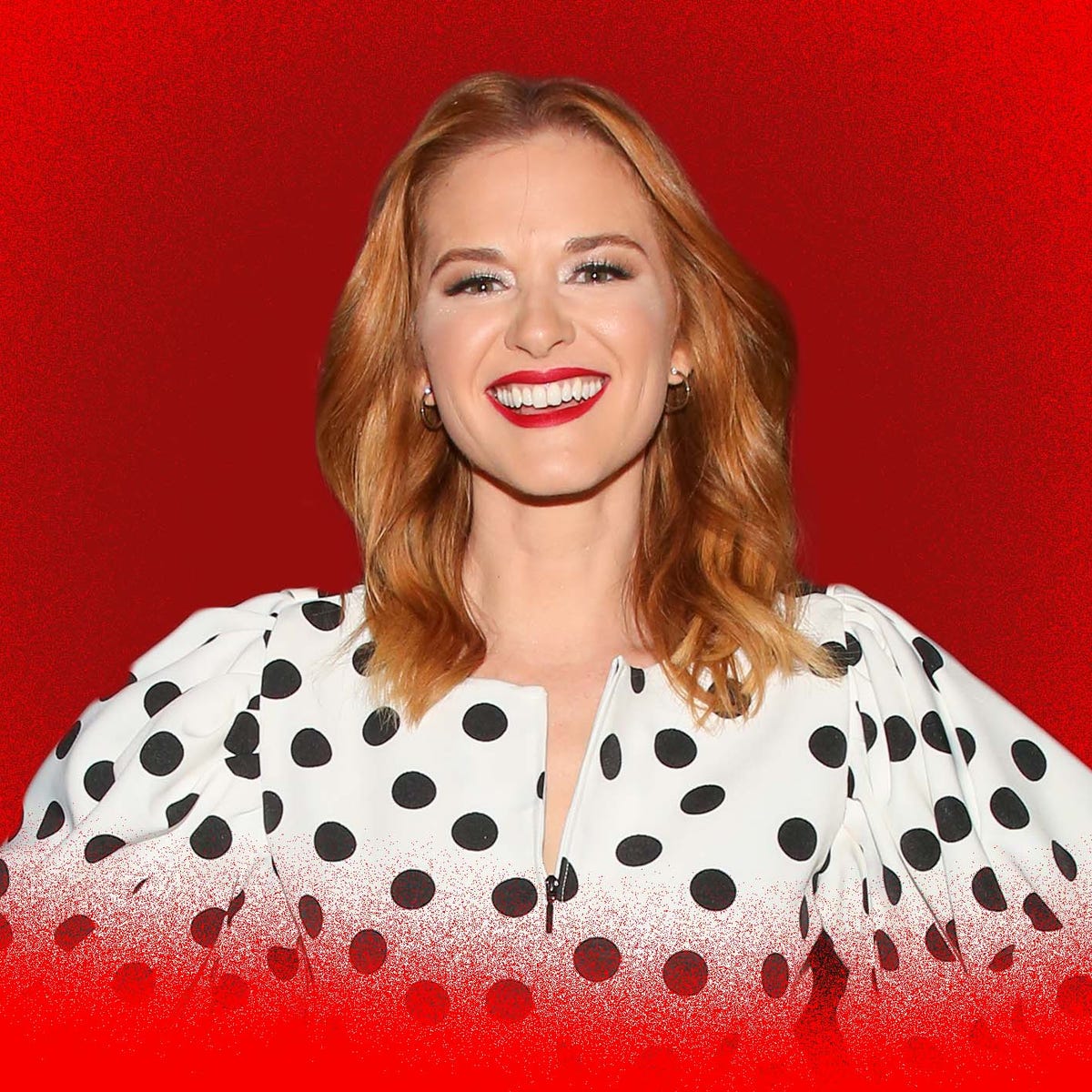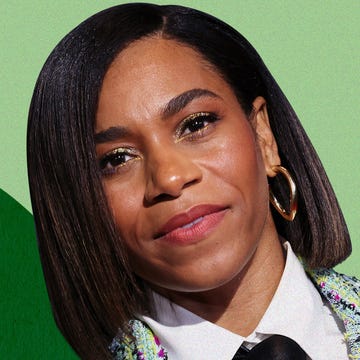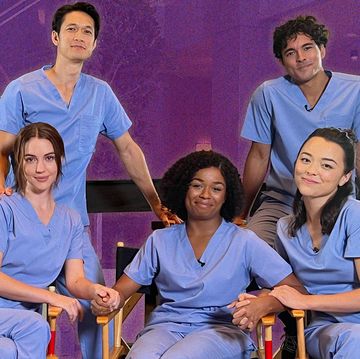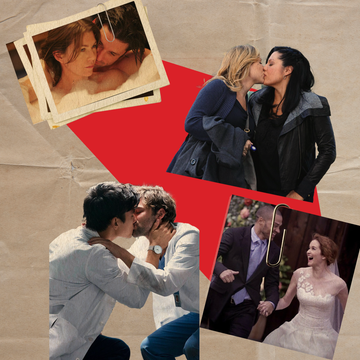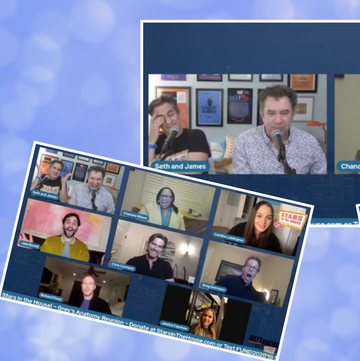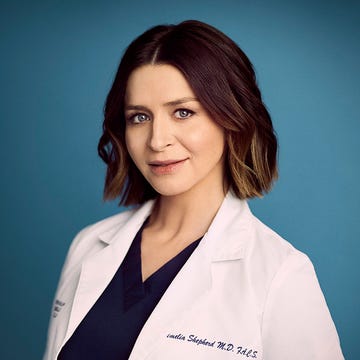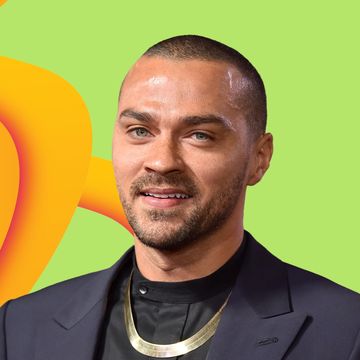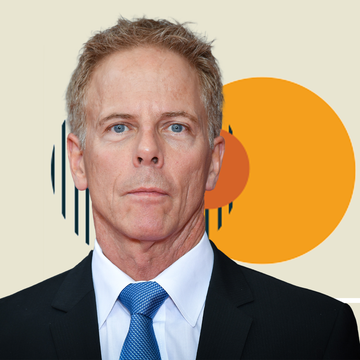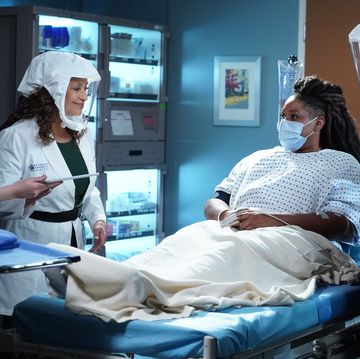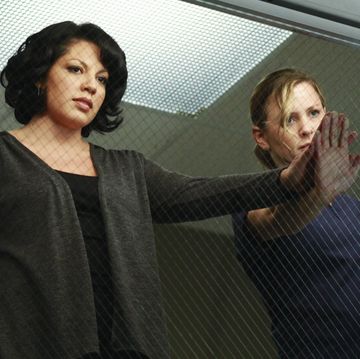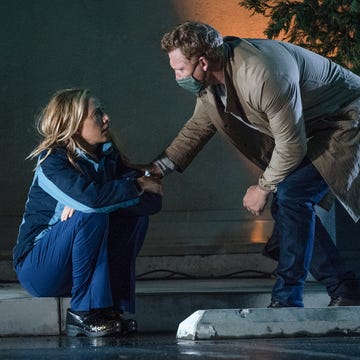The below contains spoilers for the season 18 finale of Grey's Anatomy, so read with caution!
Hearing Sarah Drew list her upcoming projects is like taking a whirlwind spin through a creative mind. There’s the Christmas rom-com Reindeer Games she just wrapped. The upcoming Apple TV+ show Amber Brown, about a girl coping with her parents’ divorce through music. A recently greenlit film about German immigrants. And a writing project that she toys with explaining before apologetically changing course. “It’s a very different kind of story,” Drew notes. “I won’t even go into it because it’s still very much in development.”
But she also knows she has someone specific to thank for all this creative freedom: April Kepner. On the strength of Drew’s sensitive portrayal, April, the wide-eyed resident, went from a two-episode arc to series regular on nine seasons of Grey’s Anatomy. Drew calls her “more than a sister,” and it’s easy to see why. From April’s evolution to a trauma surgeon to the on-again, off-again relationship with Jackson Avery (Jesse Williams), to dealing with the death of one child and the birth of another, the two have come a long way together.
The last time we viewers saw April, she was reunited with Jackson (in Williams’ final Grey’s episode after 12 seasons on the show) when he decided to move to Boston to take over his family foundation. Given that the two share a daughter, April agreed to follow Jackson, giving #Japril fans all the hope they needed that one of the series’ favorite couples might finally get back together. If you caught May 26th’s season 18 finale, then we don’t have to tell you — some dreams do come true.
Ahead of her return to Grey’s, we sat down with Drew — who also recently appeared on Katie Lowes' podcast, Katie's Crib, to talk about motherhood and faith — to discuss moving on, seeking balance, and why we should use the word “love” as much as possible.
LAURA STUDARUS: It seems like with all your different projects, you’ve really created a balanced career.
SARAH DREW: Balance is a big thing for me. It’s work-life balance. It’s making sure I have enough time with my family and my community. I can start to get itchy to go do a project and be on a set, and then I get itchy to get back home. As long as I can have both of these things going, it’s fun. And now with producing and writing, it has been such a fun, new journey for me, and I get really into it. It’s like a blanket of goodness covers me. I love it so much. I like making the choices and decisions, and seeing the locations, and picking the set.
LS: And now you’re getting to revisit April Kepner.
SD: I just love April. She’s such a part of me. She’s like a sister. I love hopping back into her shoes, even if it’s just for a brief moment.
LS: As you’ve gotten older and grown in your career, are you able to look back at April’s story and have a different appreciation or compassion for the choices she made?
SD: Absolutely. I think taking a break from her and seeing the forest for the trees, as opposed to being just consumed by her, helped because sometimes those storylines that were really traumatic, it was very hard to detach from, to detach my body and my spirit from what was going on with her. And because I love her so much, and I cared so much about how she was being formed, it was burdensome when I was in the middle of it. But engaging with fans about stories that have affected them and impacted them — there were things that gave so many people so much hope, and still do. I see how there was pain and sacrifice in telling that, but it’s mixed with such goodness. My big life journey over the last several years has been about holding pain and joy together because they both exist in the world, and trying to avoid pain doesn’t work. So, how do you find joy even in the midst of pain? I think April’s journey has a lot of that interwoven experience that people resonate with — and I certainly resonate with.
LS: What are some of those moments that have resonated for both you and fans?
SD: I think losing her baby was a really big one. I’ve had a lot of people talk to me about their journeys through miscarriages and losing babies, and it was like that story had given them a safe space to grieve and feel all the things they needed to feel, and they felt really seen. And that was hard because I was pregnant with my daughter when that happened. We had this labor-delivery death scene of Samuel where we shot that for 10 hours, and then I went into premature labor, and my daughter was in the NICU. It really affected me. I call them God moments, just beautiful light piercing through the darkness moments as a result of telling that story that I wouldn’t change. And Hannah is like the healthiest kid ever now!
I think the other big story that made a huge impact on my life was her crisis-of-faith storyline in season 14. I think a lot of people resonate with losing your identity. And how do you find your way through that or back to who you want to be? I found that people that weren’t even religious in any way resonated with that storyline because you can resonate with loss of self. We all kind of go through little deaths along the way as we get older. And how do you navigate through that stuff? Does any of it strip your joy, or does this shifting lead to greater, deeper joy? I think that episode with the rabbi was a huge catharsis for a lot of people and certainly for me. I go back to that episode whenever I’m feeling angry at God or I don’t understand what’s going on in the world.
LS: That really speaks to how long Grey’s has been going on, that we get to see characters have all these developments. Why do you think the show has been able to withstand the test of time in such an extraordinary way?
SD: I had a friend going through a divorce who told me that she found watching episodes of Grey’s Anatomy was the most healing thing that she could do for herself. And she had found online chats with whole groups of people who watch Grey’s Anatomy while they’re going through a divorce. I think there’s something about being able to witness and feel these characters go through very big, deep, Earth-shattering things. It allows you as a viewer if you’re going through a very big, deep, Earth-shattering thing to howl, and wail, and cry, and feel everything in a safe space. It’s a cathartic show. You watch it to cry. And you love the people because you see yourself in the people. This was revolutionary, to give voice to so many different people from so many different walks of life. So, I think that’s also what’s kept people feeling represented, and seen, and loved on the screen.
LS: In 2020, I spoke with Debbie Allen, who told me about revamping work days when she came on as a show producer. Where did you begin your journey of being able to advocate for yourself and what you need as an actor and person who might not want to work 17-hour days?
SD: What was really great is that I had amazing examples in front of me, like Sandra Oh, who always had a voice on that set. She was always advocating for her character with the writers, had ideas, and was navigating stuff. I was like, if Sandra can do it, then maybe I can also do it. And I was invited to participate in my character’s journey, especially her faith journey, which made me feel really empowered. I came on the show, and it was like, all the women on the show had had babies. You go on a Shondaland show, and then you have your baby because you know it’s a safe place to do it. I do remember after giving birth to Hannah, I was struggling with some postpartum and anxiety, and it would throw me off tremendously if I had to shoot an all-nighter on a Friday night, because I didn’t have help on the weekends, and I would get home just as my baby was waking up. I went to Shonda to say, “This is not sustainable. Is there anything we can do about this?” And she was like, “From this point on, you will never work the second half of a Friday. Done.” I wish everywhere was like that. I wish that there wasn’t a culture of fear for women becoming mothers in our industry.
LS: Are you able to help translate that environment to other projects?
SD: Yeah! Since I left Grey’s, I’ve been able to be in a leadership position. Almost every single project I’ve done, I’ve either been No. 1 on the call sheet, or I’ve been producing it. So, I’ve gotten to set the tone right away. I know what nurtures me as an actor, and I know what’s toxic and what hurts me as an actor. One of the greatest things that I love to bring in is just the idea of collaboration. There’s just no ego if we’re walking into this group effort to make this project. We would shift things when we were on set together, and it would be better. And it makes people feel like they have ownership over it too, that we’re all in this together. And we all have a voice, and we’re all valued.
LS: April gives an unexpected eulogy to a very alive Catherine Fox on this episode. What would you hope people would say while remembering you?
SD: I got killed for this in the press when I left the show in season 14. I said in multiple interviews I felt like I had been attending my own funeral. Of course, that was the headline, and nobody investigated what I mean by that. When it was announced that I was leaving the show, the outpouring of love that I received from my cast and crew was so epically beautiful that I would go through the pain of being written off again in order to experience what that outpouring was. The love and support that I felt from everybody in the Grey’s community and then also from the fans, it was like insanity. So yeah, I feel like I’ve experienced a little taste of that — and what a gift! I’m such a big believer in if you love someone, tell them! That’s one of my big love languages, verbal affirmation. I like to write notes to people and tell them why they mean so much to me. Why do you wait until they’re dead to share all the good stuff? We should do it now so that we know how loved we are.
Laura Studarus is a Los Angeles-based travel writer who has contributed to Fast Company, BBC Travel, and Thrillist. Follow her on Twitter at @Laura_Studarus.
Get Shondaland directly in your inbox: SUBSCRIBE TODAY
